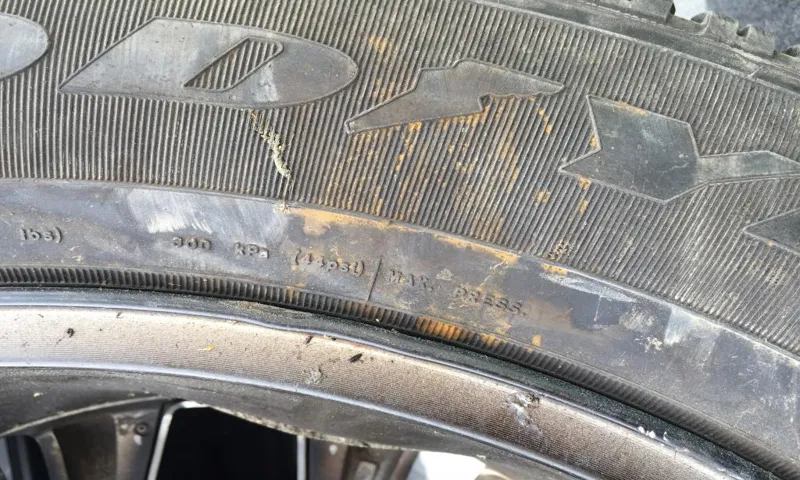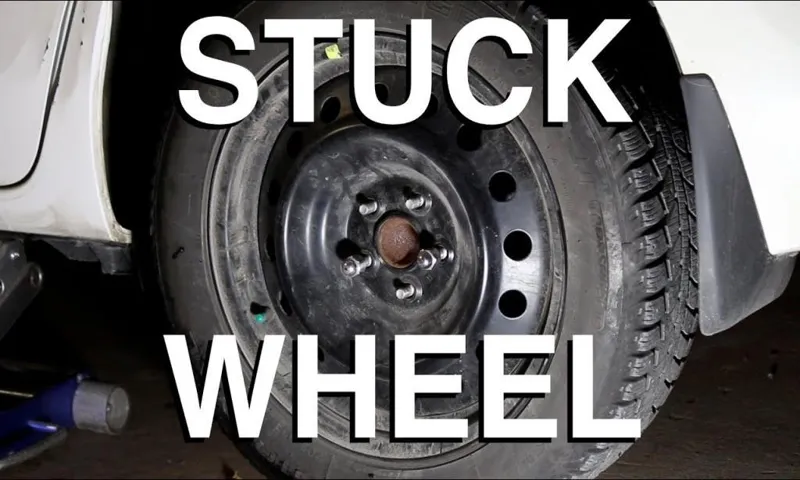Have you ever been driving on the freeway and found yourself dodging a rogue tire rolling towards you? It can be a terrifying experience and leaves you wondering how and why a tire would come off while driving. Well, there are several reasons why this can happen, and it’s important to understand them to prevent it from happening to you. From improper installation and maintenance to road hazards and extreme temperatures, a tire can quickly come off without warning.
In this blog, we’ll dive deeper into the causes of tire separation, so you can better equip yourself with the knowledge to avoid it.
Loose Lug Nuts
“What would cause a tire to come off while driving?” Well, one of the most likely culprits could be loose lug nuts. These nuts attach the wheel to the car’s hub and need to be tightened to a specific torque to ensure they won’t loosen over time. If they are not tightened correctly or become loose due to wear and tear, the wheel can become wobbly and eventually detach from the hub while driving.
It’s essential to have them checked and tightened regularly by a professional to prevent any dangerous situations on the road. So stay vigilant and keep your wheels tight and secure!
Failure to Properly Tighten Lug Nuts During Installation
Have you ever felt your car shaking while driving on the highway? It could be due to loose lug nuts. One of the primary causes of this issue is the failure to properly tighten the lug nuts during installation. This can happen when a mechanic rushes through the process or does not use a torque wrench.
Lug nuts should be tightened to a specific torque value to ensure they are secure. If the lug nuts are not tightened correctly, they can come loose over time or even during driving. Loose lug nuts can cause an uneven wear pattern on the tires, damage to the wheel bearings, and even result in a dangerous accident.
To avoid this, it is crucial to take your vehicle to a reputable mechanic who will take the time to properly torque the lug nuts during installation. It may seem like a small detail, but it can make a huge difference in the safety and longevity of your vehicle.

Over-tightening Lug Nuts Can Also Lead to Failure
When it comes to the safety of your vehicle, proper maintenance is key. Loose lug nuts can be a potential hazard on the road, and over-tightening them can also lead to failure. It is important to follow the manufacturer’s recommended torque specifications when tightening lug nuts.
Over-tightening can cause the lug nuts to stretch and weaken, leading to potential failure down the road. Additionally, over-tightening can lead to difficulty in removing the lug nuts during future maintenance, causing unnecessary damage to your vehicle. Always check your lug nuts regularly and ensure they are properly tightened for the safety of yourself and others on the road.
Tire Blowouts
If your tire suddenly comes off while driving, it could be caused by a tire blowout. There are a few things that can cause a tire blowout, but the most common reasons are underinflation, worn out tires, and hitting sharp objects on the road. When a tire is underinflated, it can overheat and cause the rubber to separate from the steel belts.
This can result in the tire suddenly bursting while driving. Worn out tires can also cause a blowout, as the tread becomes too thin to properly grip the road. When driving on the highway, hitting debris or sharp objects can puncture the tire, causing it to rapidly deflate and potentially come off.
It’s important to regularly check tire pressure and replace worn tires to prevent a blowout from occurring. If you do experience a tire blowout, try to remain calm and slowly steer to the side of the road to avoid losing control of your vehicle.
Under-inflated Tires are More Prone to Blowouts
Tire Blowouts are no joke, and they can be pretty dangerous. A blowout occurs when your tire suddenly bursts or loses air quickly, causing a loss of control of the vehicle. One of the main reasons why tire blowouts happen is under-inflated tires.
When a tire doesn’t have enough air, it gets overstressed and overheated, which ultimately results in a burst. That’s why it’s crucial to keep an eye on the tire pressure in your vehicle and ensure it’s at the recommended levels. Not only does this help prevent blowouts, but it also improves fuel efficiency and extends tire life.
In fact, studies suggest that up to 75% of cars on the road have under-inflated tires. So, if you want to avoid being part of the majority, make sure to inspect your tire pressure regularly, especially before long trips. Remember, an ounce of prevention is worth a pound of cure – in this case, avoiding a potential blowout, injury, and costly repairs.
Overloading the Vehicle can also Lead to Blowouts
Tire blowouts are a common and dangerous occurrence on the road, and one of the leading causes is overloading the vehicle. It’s essential to remember that tires have a specific weight capacity, and exceeding that capacity can cause severe damage to the tires, eventually leading to a blowout. Overloading adds excess weight and pressure to the tires, causing them to wear out faster and decrease in performance.
This is especially true for long-distance travel or when carrying heavy loads. It’s essential to ensure that the vehicle’s weight is distributed evenly and within the limit specified by the manufacturer. In conclusion, be mindful of the loads you carry and remember to check your vehicle’s weight limit to prevent tire blowouts.
Old or Worn Tires are More Prone to Blowouts
Tire Blowouts One of the scariest things that can happen while driving is experiencing a tire blowout. It can be sudden, and it can cause you to lose control of your vehicle and risk being involved in an accident. That’s why it’s essential to give your tires the attention they deserve and ensure they are in good condition.
Old or worn tires are more prone to blowouts, so it’s important to monitor their age and tread depth regularly. As tires age, they become hard and brittle, losing their flexibility, and making them more susceptible to a blowout. The heat generated by driving can increase the pressure inside the tire, making it more vulnerable to bursting if the tire is already weak.
That’s why it’s vital to ensure you replace your tires before they get to this stage. Don’t take chances with your safety and that of others on the road. Ensure you replace old or worn tires and avoid the possibility of experiencing a dangerous tire blowout.
Suspension Problems
Have you ever experienced a tire coming off while driving? This can be a scary situation, and it’s important to understand what can cause it to happen. One common culprit is suspension problems. If the suspension system is not functioning properly, it can put added stress on the tires and cause them to come off.
This can be caused by worn-out or damaged suspension components, such as ball joints, tie rods, or control arms. Additionally, if the suspension is not properly aligned or adjusted, it can cause uneven wear on the tires, leading to damage and potential failure. It’s important to regularly inspect and maintain your suspension system to avoid any dangerous situations on the road.
Don’t ignore any unusual noises or vibrations coming from your vehicle, and have a professional mechanic check your suspension system regularly to keep you and your passengers safe.
Worn or Failed Suspension Components can Lead to Tire Movement
Suspension problems can greatly affect the performance of your tires. When your suspension system wears out or fails, it can lead to unwanted tire movement, causing your car to handle poorly on the road. This can also result in uneven tread wear on your tires, which will ultimately reduce their lifespan.
It is necessary to check your suspension system regularly for signs of wear or damage, such as clunking or knocking noises, uneven tire wear, or a bumpy ride. If you notice any of these symptoms, it is essential to have your suspension system inspected by a certified mechanic. Addressing suspension problems early on will not only prevent further damage to your tires but also keep you safe on the road.
Therefore, it’s crucial to prioritize regular maintenance for your suspension system to ensure your tires operate at optimal performance.
Unbalanced Tires Can Cause Suspension Components to Wear Unevenly
Suspension problems occur when there’s an issue with your vehicle’s suspension system. Unbalanced tires can cause suspension components to wear unevenly, leading to severe suspension problems. This can result in an uncomfortable ride, decreased stability, and alignment issues.
Your suspension components will wear out faster and need replacing more frequently if you regularly drive on uneven roads or over potholes. To avoid these issues, make sure that your tires are balanced and aligned regularly. If you notice any problems with your suspension, such as a harsh ride, steering difficulties, or vibrations, then it’s crucial that you take your vehicle to an auto repair shop to have it inspected.
Ignoring suspension issues can lead to more severe problems in the future and will ultimately be more expensive to fix. Don’t wait until it’s too late, take care of your suspension system today before it causes irreparable damage.
Conclusion
So, in summary, the mystery of why a tire would suddenly disappear from a moving vehicle has been solved. It turns out that the culprit could be a number of things – from poor maintenance and wear and tear, to hitting a pothole or debris on the road. Or, if you believe in conspiracy theories, maybe it was that pesky tire thief who strikes once a year to keep us all on our toes.
Either way, it’s always important to keep those wheels in good shape to avoid any unexpected detours on the road of life.”
FAQs
What are the signs that a tire may come off while driving?
Signs that a tire may come off while driving include shaking or vibrating steering wheel, loud thumping noises from the tires, and uneven wear on the tires.
How can I prevent a tire from coming off while driving?
You can prevent a tire from coming off while driving by ensuring proper tire maintenance, regularly checking tire pressure, avoiding overloading your vehicle, and inspecting lug nuts and bolts.
How often should I replace my tires to prevent them from coming off while driving?
It is recommended to replace your tires every 6 years or 60,000 miles, whichever comes first. Additionally, it is important to check for signs of wear and tear, such as balding or cracking, and replace your tires accordingly.
Can worn-out wheel bearings cause a tire to come off while driving?
Yes, worn-out wheel bearings can cause a tire to come off while driving. This is because faulty wheel bearings can cause uneven pressure on the tires and potentially lead to a tire coming off.
What should I do if a tire comes off while driving?
If a tire comes off while driving, try to remain calm and steer your vehicle to a safe location. Turn on your hazard lights and ensure that nobody is injured. Call for roadside assistance and have your vehicle towed to a nearby mechanic for repairs.
How long does it take to repair a tire that has come off while driving?
The length of time it takes to repair a tire that has come off while driving can vary depending on the extent of the damage. It can take anywhere from a few hours to a few days to repair a tire that has come off.
Can driving on a flat tire cause it to come off while driving?
Yes, driving on a flat tire can cause it to come off while driving. This is because the uneven pressure on the tire can cause it to come loose from the wheel, leading to a potentially dangerous situation.


